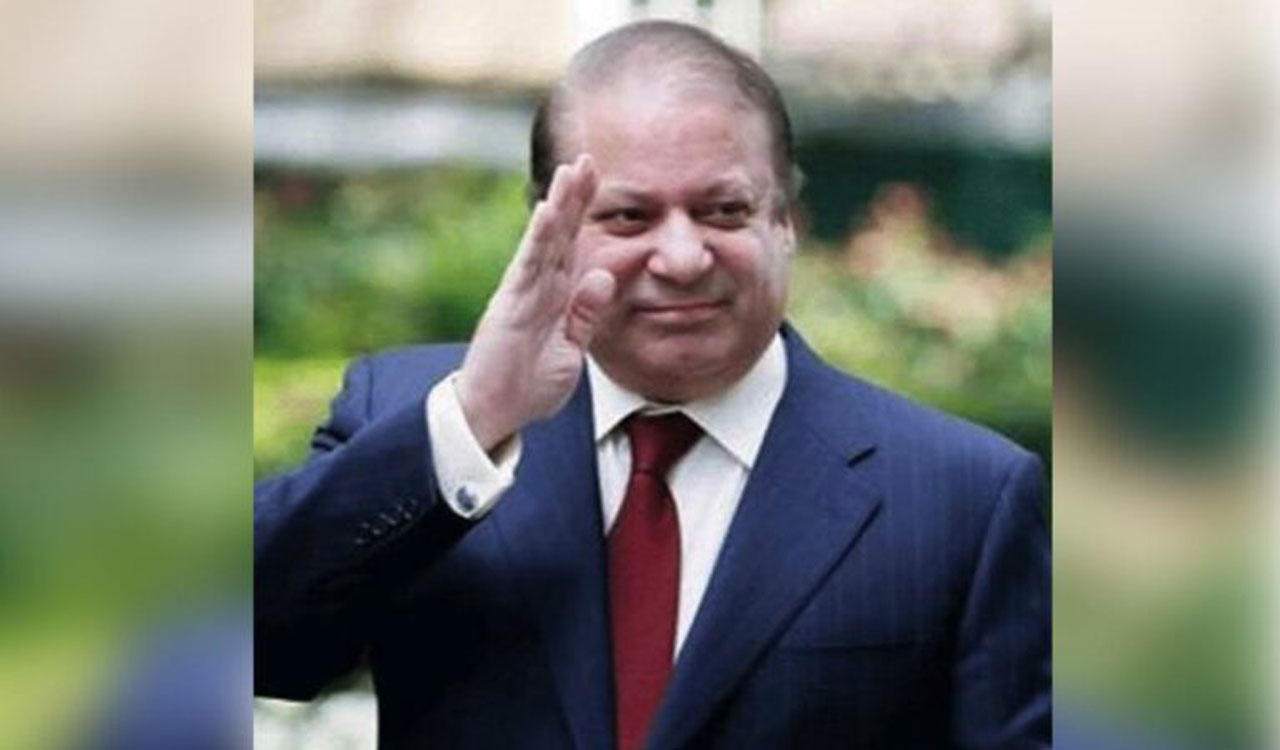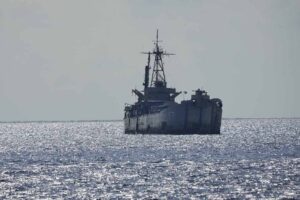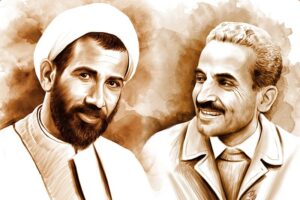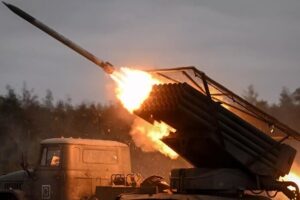Subsequently, the party leaders, including Shehbaz, started saying that “Nawaz Sharif was coming to fix the economy and not to seek revenge against anyone.
Published Date – 05:49 PM, Fri – 20 October 23

File photo
Islamabad: Unfazed by the threat of arrest and incarceration, former Pakistan prime minister Nawaz Sharif is expected to return to the country after four years on Saturday to lead his party in the next general elections and try and secure a record fourth term for himself.
After spending two days in Saudi Arabia, Sharif is currently in Dubai to meet some people and is expected to fly here in a chartered plane. He is then expected to head to Lahore to address his party’s rally at Minar-e-Nawaz Sharif . Since he has secured preventive bail in two corruption cases, he is unlikely to be arrested upon landing in Islamabad.
Sharif, 73, was on a self-imposed exile in the United Kingdom after jumping bail in 2020. The leader of the Pakistan Muslim League-Nawaz (PML-N) was serving a seven-year jail term when the Islamabad High Court suspended his sentence in 2019 for eight weeks to allow him to go abroad to seek medical treatment, but he never came back.
A medical report on his health submitted to the Lahore High Court earlier this month said Sharif still had “some residual anginal symptoms” which would require “frequent follow-up investigations” in London and Pakistan.
The former premier – who began politics under the wings of military ruler General Zia ul Haq as the finance minister of Punjab province in 1981 and then as its chief minister in 1985 – is up against heavy odds due to multiple complications, both legal and political.
Soon after his landing in Islamabad or Lahore on October 21, he would have been arrested if the courts had not intervened as Sharif was declared a proclaimed offender in the Al-Azizia steel mill corruption case by the Islamabad High Court in 2020 and declared as an absconder by an accountability court due to his absence from attending proceedings.
However, the Islamabad High Court approved a protective bail until October 24 while an Islamabad-based Accountability Court suspended his permanent arrest warrants in the Toshakhana vehicles case until the same date, thus removing legal bars in the way for Sharif to land safely and address a rally as planned to be “mammoth” by his party.
Uzma Bokhari, PML-N leader, said every person has a right to get access to the court and there are several instances of protective bail given to convicts to let them approach the courts. “Nawaz Sharif was convicted in fake cases of corruption and he would not only get bail but also his conviction would be reversed,” Bokhari said while participating in a recent television talk show.
Dr Hasan Askari Rizvi, a renowned political analyst, said, Sharif may face several problems, primarily due to court cases.
“There are several political hurdles in his way due to the two convictions of 2018,” Rizvi said.
Apart from the Al-Azizia steel mill corruption case, the former prime minister was also convicted in the Avenfiled property case, in which he has already secured bail.
Pointing out that protective bail is given to an accused to access a court and not a convict, eminent lawyer Ahmad Awais said: “Since Sharif is not a convict, he does not deserve a protective bail on merit. There is no precedence of protective bail to a convict.” Sharif has also challenged the conviction in both cases in the Islamabad High Court, which may or may not undo his conviction for him to contest any election or be appointed to a public position.
“Given the fact that elections are expected to be held towards the end of January, he can get relief if the judicial process is fast-tracked to get a verdict, and that too in his favour,” said a party leader. The Election Commission of Pakistan has announced that the elections are expected to be held in the last week of January 2024.
But conviction in the corruption cases notwithstanding, Sharif’s major challenge arises from his disqualification by the Supreme Court in 2017. According to the apex court ruling, the disqualification is for life, but his party disagrees with it.
PML-N leader Azam Tarar said that after changes introduced in the election laws, Sharif’s disqualification was reduced to five years, and he had already completed the term and was eligible to contest elections.
His opponents believe that a simple law enacted by Parliament cannot undo a Supreme Court verdict which can only be rectified by an amendment made in the Constitution with a 2/3rd majority.
Apart from the legal challenges, Sharif would also face political challenges on many fronts.
He faces a formidable political challenge from another former prime minister Imran Khan, and his Pakistan Tehreek-e-Insaf (PTI) party. Though Khan’s future is also in limbo and the PTI has been weakened due to many senior leaders quitting it in the wake of the May 9 violence, the former cricketing hero is still considered more popular than any other leader in Pakistan.
On May 9, Khan’s supporters launched a series of attacks on key military installations, including on the Lahore Corps Commander’s House, and government properties following the arrest of their leader in an alleged corruption case.
But the bigger worry for Sharif is his own party’s performance. The lacklustre show by PML-N during its 16-month rule when his younger brother Shehbaz Sharif became prime minister in April last year has prompted the party leaders to desperately reach out to him to lead in the upcoming elections.
Despite his conviction in two cases of corruption, Sharif is still popular to a degree, and his followers are hoping his presence in the country during the poll campaign would boost the party’s prospects.
Nevertheless, Sharif would be tested on how to win back the confidence of his supporters and workers, disappointed with Shehbaz Sharif’s leadership, who they believe, failed to tackle inflation and provide relief to the masses amidst the economic crisis.
PML-N vice president Hamza Shehbaz has said that Sharif will unveil a road map to pull the cash-strapped country out of the economic mess during the rally at the Minar-e-Pakistan in Lahore on October 21 which will “restart its journey towards progress and prosperity.” But Sharif’s biggest test would be to get a thumbs up from the powerful establishment or the Pakistan Army. In the past, Sharif was elected thrice – in 1990, 1997, and 2013, but every time thrown out of the government before the completion of his term after developing differences with the army leadership. In 2017, when he was removed after he was disqualified by the Supreme Court, he blamed the military top brass.
The key question that political observers are asking is: Has Sharif learned the key lesson on how to rule in Pakistan? Last month, virtually addressing party leaders in Lahore from London, the PML-N leader demanded action against former army chief General Qamar Javed Bajwa and former ISI chief Lt. General Faiz Hameed for creating the mess the country was currently in.
The unexpected outburst forced his younger brother Shehbaz to air-dash to London to convince him to restrain his outburst against the establishment.
Subsequently, the party leaders, including Shehbaz, started saying that “Nawaz Sharif was coming to fix the economy and not to seek revenge against anyone.” The elder Sharif has been quiet after the meeting with his younger brother but several people believe there is some “understanding” with the powers that be in the country.
Claiming that Sharif was returning to Pakistan after reaching an “understanding with powerful circles of the country,” analyst Shehzad Iqbal told ARY News: “Sharif didn’t return when his brother was ruling the country. So people are asking why he is coming back now. Obviously, there is some understanding.” Even PML-N’s former ally Pakistan Peoples Party (PPP) is saying that there was some understanding between the establishment and Sharif, Iqbal said.
Given his style of politics, many wonder how long Sharif would be able to restrain himself from attacking the army again even as he faces legal and political hurdles.





